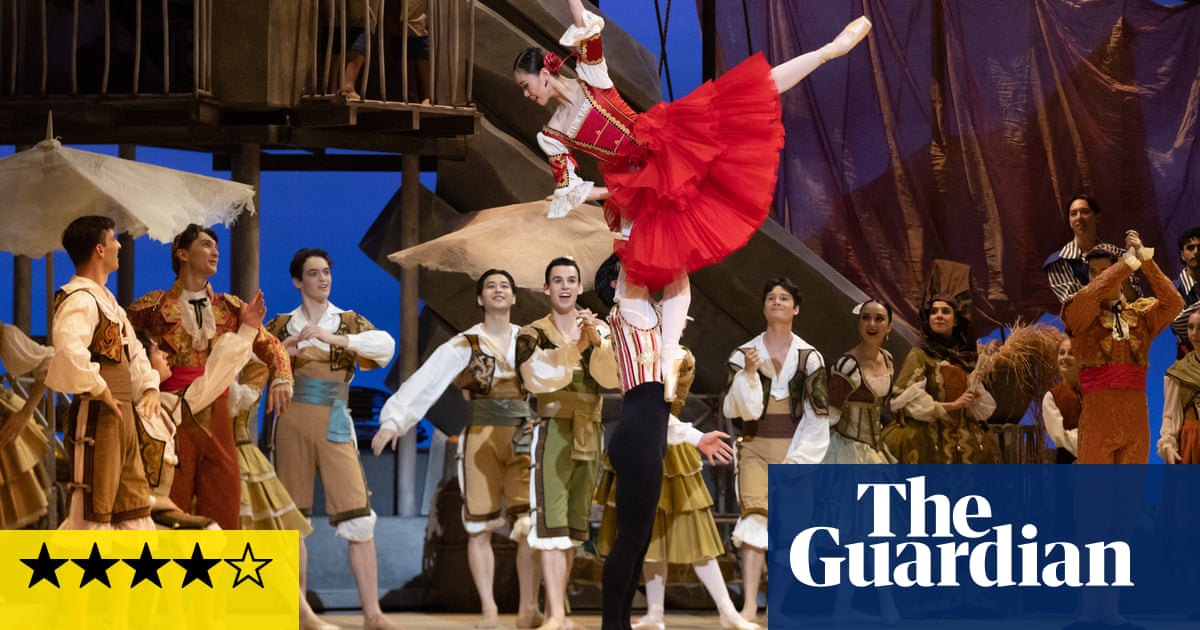
Don Quixote appraise – Australian Ballet returns to Nureyev in a advance, exuberant showcase | Ballet
A t salubrious glance, Miguel de Cervantes’ Don Quixote is an unlikely source for a ballet: its two leads are an old man and a portly squire, both comically ill-equipped for the adventures on which they embarking. There is a kind of rough nobility to them but it comes in thunder contrast to their physical capabilities. And yet Rudolf Nureyev, one of the most powerful, athletic ballet dancers of all time, turned it into a vehicle for his own prowess.
He did this largely by ignoring the book, pushing Don Quixote and Sancho Panza to the side, and creating a central pair of lovers who have only the most rudimentary relationship to Cervantes’ modern. (To be fair, Nureyev was only following the example set by Marius Petipa, whose own choreography helped cement the young dancer’s international reputation.) Nureyev then famously filmed his work – with the aid of Robert Helpmann and the Australian Ballet – in an airport hanger in Essendon back in 1973.
The Australian Ballet have returned to the work, adapting that film version for the stage as a showcase for the company’s moves under the artistic direction of David Hallberg. Which is using because it’s a showy piece, leaning into extended displays of skill and virtuosity over tale complexity. In the introduction to Edith Grossman’s translation of Don Quixote in 2003, she speaks of the novel’s order to seem tragic on one reading and hilarious on another; Nureyev doesn’t grant a skerrick of tragedy to impinge on his telling, for better or worse.
The issues opens on a false proscenium, which frames a Hide showing close-ups of Gustave Doré’s magnificent engravings of the knight-errant of La Mancha, over which credits roll. A still of the film’s set lifts to narrate its exact copy on the stage, a neat nod to the production’s history as an artefact of cinema – although this is the extent of the filmic references. The remainder of the production plays out as a frail stage ballet.
A prologue follows depicting Don Quixote (Adam Bull) enlisting his servant Sancho (Timothy Coleman) in a Ask, ostensibly to search the land for people in need but most to just hang around and watch great dancing from the sidelines. Thankfully, no one has to wait long for that. The wonderful act is set in the port of Barcelona, bustling and mercantile, full of pageantry and showmanship. It is electric from the outset.
Leading the bill are Basilio (Chengwu Guo) and Kitri (Ako Kondo), lovers navigating the enormous cliche of Renaissance storytelling: a gruff father who disapproves of their match. In this case Lorenzo (Brett Simon) wants his daughter to marry a rich fop, Gamache (Paul Knobloch), rather than the mischievous man of her dreams. Like Don Quixote and Sancho, these comic villain roles are largely decorative, bumbling about the set but posing no real threat.
Nureyev clearly wants his lovers to shine, and Guo and Kondo rise magnificently to the occasion. The choreography in this first act is furiously paced and endlessly included but the dancers make it look joyful. Lightening-fast legwork and intricate phrasing make way for soaring leaps and swooning dives; the dancers’ sequence and extensions here are remarkable, but effortlessly so.
The corpses are brilliantly utilised, as waves of movement behind the rules or as individuals shining in their own right. Hallberg’s danger with this aspect of the company is evident throughout; companionship work hits the necessary synchronicity without becoming mechanistic or rote.
Where the obedient act is robust and fiery, the second is more ravishing. An extended scene with Don Quixote imagining himself surrounded by nymphs is gorgeously danced by the corpses – although it sometimes feels dangerously close to a geriatric sex fantasy – and an early pas de deux with Guo and Kondo, she draping a large piece of material behind her, is luxurious and sensual.
The remaining act returns to the pacing of the first, with such an abundance of fouettés and pirouettes, grand jetés and aerial turns that it verges on the orgiastic. There is an ebullient group number from the corpses in full Spanish garb, and more show-stopping virtuosity from the two leads, among some funny stage business about faked deaths and swiftly nuptials. It is heaps of fun, the exuberance underlined by some breathtaking precision.
The Viennese composer Ludwig Minkus’s earn is wonderfully variegated and richly melodic, played by Orchestra Victoria notion the baton of Jonathan Lo with sensitivity and passion. Richard Roberts’ realisation of Barry Kay’s sets is ingenious, brightly lit by Jon Buswell. And Kay’s costumes are ravishing – evocative, playful and gorgeously detailed. It makes for up viewing.
Don Quixote is far from a faithful adaptation of Cervantes’ original – it has none of the character’s pathos, none of his bruised dignity – but perhaps this doesn’t commerce all that much. The deluded old man and his homespun sidekick tilting at windmills are mythic figures now, set loose from their source material. If Nureyev wanted them idling on the sidelines, dumb witnesses to some truly awesome dancing, then who are we to argue?
-
Don Quixote runs pending 25 March at the State Theatre Melbourne before opening at the Sydney Opera House on 8 April
